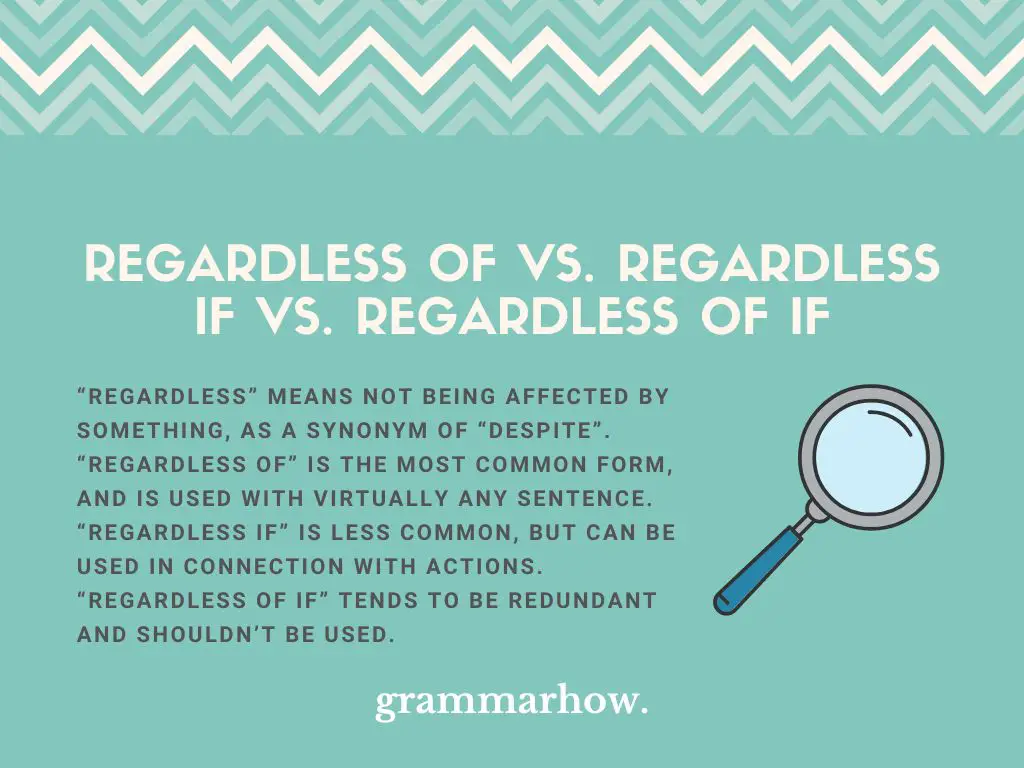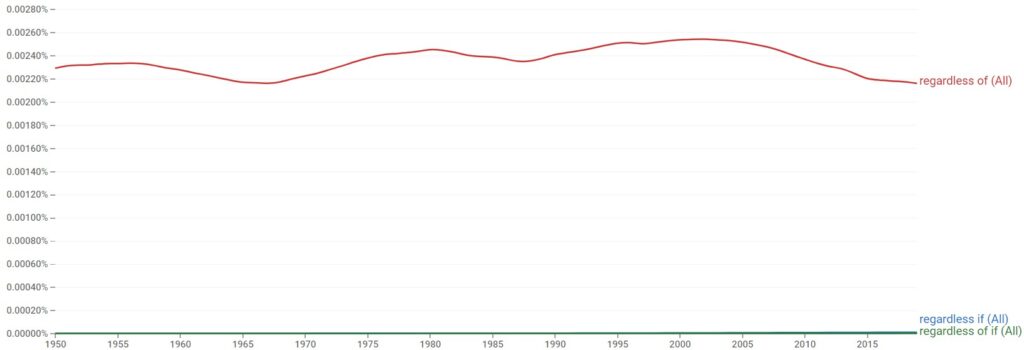Sometimes, phrases can be a little confusing. Think about “Regardless of”, “Regardless if” and “Regardless of if”. When should we use each? What does each form mean? Are they all correct, or is there one we should avoid?
Let’s take a deep look and find out.
Regardless of vs. Regardless if vs. Regardless of if
“Regardless” means not being affected by something, as a synonym of “Despite”. “Regardless of” is the most common form, and is used with virtually any sentence. “Regardless if” is less common, but can be used in connection with actions. “Regardless of if” tends to be redundant and shouldn’t be used.

Take a look at the examples below:
- You should just be yourself, regardless of people’s negative opinions.
- You should just be yourself, regardless if people express negative opinions.
- You should just be yourself, regardless of if people express negative opinions.
The examples show variations of the same sentence, so you can compare the use of “Regardless of”, “Regardless if” and “Regardless of if”.
The first sentence, which includes “Regardless of”, is the most common way this sentence would appear in a real conversation. It’s idiomatic and sounds very organic.
The second sentence includes “Regardless if”. For that to work, we had to change the sentence, so it’d reflect an action. In other words, we people have to be doing something, such as “express negative opinions”.
It’s the verb “express” performing the action that allows us to use “Regardless if” and to say “regardless if people’s opinions” would be incorrect.
The third sentence uses the form “Regardless of if”. Although the sentence is grammatically correct, it isn’t idiomatic. It sounds strange and is redundant – which is something you always want to avoid.
We recommend that you choose between “Regardless of” and “Regardless if” and adjust your sentence accordingly to make sense. But try not to use “Regardless of if”.
Regardless of
“Regardless of” is the most common phrase amongst the ones we’re looking into in this article. It’s grammatically correct and can be used to address any topic, with no limitations, to indicate a person isn’t affected by something.
Take a look at some examples:
- Branda’s going out, regardless of her parent’s restrictions.
- Jimmy rarely does his homework, regardless of the effect it has on his grade.
- I won’t go to that dinner, regardless of whether you’re going.
- Regardless of all the sleep I got, I’m still exhausted.
- The shirt promised to fit anyone, regardless of body type.
Regardless if
“Regardless if” isn’t as common as “Regardless of” because it has a more strict use. But it’s grammatically correct and you can use it, as long as you’re referring to an action that doesn’t affect the subject of the sentence. “Regardless if” has to always accompany a verb.
Take a look at some helpful examples:
- Regardless if you prefer to paint with acrylic or watercolor, both are incredibly difficult.
- She decided to take a sabbatical, regardless if her family disapproved of it.
- Regardless if you prefer sweet or salty snacks, you’ll like something in the basket.
- Everyone has faults, regardless if they are good people.
- I’m going out to dinner, regardless if you join me.
Regardless of if
“Regardless of if” is a redundant way to express the idea of “Regardless of” or “Regardless if”. Even if you manage to make a sentence grammatically correct using “Regardless of if”, redundancies should always be avoided.
Let’s look at some examples that include “Regardless of if”, followed by a revised sentence that replaces the phrase for an alternative:
- You should join the chess club, regardless of if you know anyone there.
- You should join the chess club, regardless of whether you know anyone there.
- He decided to quit his job, regardless of if they found a replacement quickly.
- He decided to quit his job, regardless if they found a replacement quickly.
- Everyone should invest time in their hobbies, regardless of if they are good at them.
- Everyone should invest time in their hobbies, regardless of being good at them.
Which Is Used the Most?
Which one of those forms is used more often, “Regardless of”, “Regardless if” or “Regardless of if”? We’ll find out by taking a look at the graph from Google Ngram Viewer below.

“Regardless of” is, by a large difference, the most used phrase. We expected that it’d be the case, because “Regardless of” is the most common form, which can accompany any sentence structure. We didn’t expect the difference would be so big, though.
We also didn’t expect “Regardless if” to be so low on the graph – as uncommon as it is, we assumed it’d be used more.
Final Thoughts
“Regardless of” is the most common, grammatically correct form you can use. It works well in most sentences and is the phrase we’re all familiar with. “Regardless if” is uncommon, but can be used with verbs, to indicate actions. “Regardless of if” is redundant and should be avoided.

Martin holds a Master’s degree in Finance and International Business. He has six years of experience in professional communication with clients, executives, and colleagues. Furthermore, he has teaching experience from Aarhus University. Martin has been featured as an expert in communication and teaching on Forbes and Shopify. Read more about Martin here.
